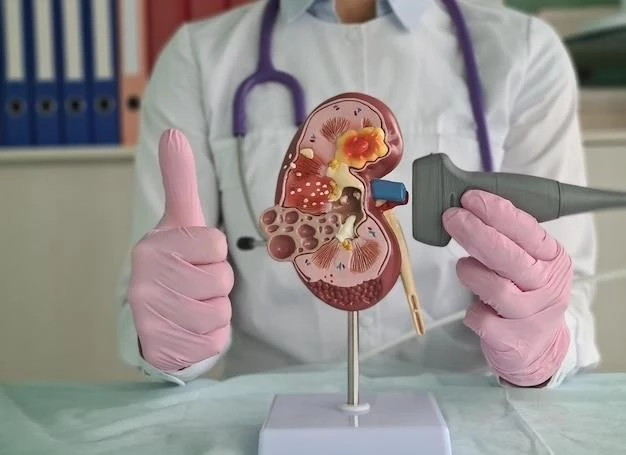Article Plan⁚ Disease ー Polycystic Kidney Disease, Recessive Type
The information available on Polycystic Kidney Disease (PKD) highlights the genetic nature of the disease, with two types being autosomal dominant and autosomal recessive. PKD leads to chronic kidney disease and possible kidney failure or end-stage renal disease.
Overview of Polycystic Kidney Disease (PKD)
Polycystic kidney disease (PKD) is a genetic disorder characterized by the growth of numerous cysts in the kidneys. There are two main types of PKD⁚ autosomal dominant polycystic kidney disease (ADPKD) and autosomal recessive polycystic kidney disease (ARPKD). PKD can cause chronic kidney disease, leading to kidney failure or end-stage renal disease. Understanding the differences between these types of PKD is crucial for effective diagnosis and treatment.
In the case of ARPKD, children are typically affected, presenting symptoms at a younger age compared to ADPKD. ARPKD is associated with cystic dilation of the collecting ducts of the kidneys and dysgenesis of the biliary ductal plate, leading to congenital hepatic fibrosis. Early diagnosis and management of ARPKD are essential to improve outcomes and quality of life for affected children.
While ADPKD is more common, occurring in adulthood and impacting multiple organs, ARPKD is rarer and often leads to severe complications early in life. Genetic inheritance plays a significant role in the development of PKD, highlighting the importance of understanding family history and risk factors. Stay informed about the latest research and advancements in the treatment of PKD to ensure the best care for individuals with this condition.
Autosomal Recessive Polycystic Kidney Disease (ARPKD) is a rare genetic disorder that affects children, typically presenting at a younger age compared to the autosomal dominant form. ARPKD is characterized by cystic dilation of the collecting ducts of the kidneys and dysgenesis of the biliary ductal plate, leading to congenital hepatic fibrosis. This condition can result in significant renal and liver-related morbidity and mortality in affected children.
The majority of individuals with ARPKD show signs early in life, with symptoms such as enlarged echogenic kidneys. Renal manifestations of ARPKD include nephromegaly, hypertension, and varying degrees of kidney dysfunction. Early diagnosis through imaging studies like ultrasound is essential for timely intervention and management.
ARPKD is associated with a genetic mutation in the PKHD1 gene located on chromosome 6p12.3-p12.2. This mutation results in the production of abnormal fibrocystin protein٫ leading to the development of fluid-filled kidney cysts and scarring. Understanding the genetic underpinnings of ARPKD is crucial for assessing familial risk and providing genetic counseling.
Research and clinical trials are ongoing to investigate potential treatments for ARPKD, aiming to improve outcomes and quality of life for affected individuals. Monitoring kidney function, managing complications such as hypertension, and providing comprehensive care are essential aspects of the treatment plan for individuals with ARPKD. Stay informed about the latest advancements in ARPKD management to make well-informed decisions regarding the health of individuals with this condition.
Etiology and Prevalence of ARPKD
Autosomal Recessive Polycystic Kidney Disease (ARPKD) is a rare genetic disorder affecting approximately 1 in 20,000 live births, with a carrier frequency of 1 in 70 in nonisolated populations. The condition is linked to pathogenic variants in the PKHD1 gene located on chromosome 6p12.3-p12.2, encoding a large transmembrane protein pivotal for kidney and liver development.
Understanding the genetic basis of ARPKD is crucial for diagnosing and managing the disease effectively. The broad variability in age of presentation, with one-third of patients showing symptoms before the age of 1٫ emphasizes the importance of early detection and intervention in improving outcomes.
Given the significant morbidity and mortality associated with ARPKD, it is essential for healthcare providers to recognize the clinical manifestations of the disease, such as enlarged echogenic kidneys and nephromegaly, to initiate appropriate care promptly. Genetic counseling and testing may be recommended for families with a history of ARPKD to assess the risk of inheritance and provide support.
Stay informed about the latest advancements in ARPKD research and treatment options to ensure comprehensive care for individuals with this rare genetic disorder. Collaborating with a multidisciplinary healthcare team experienced in managing pediatric renal and hepatic conditions can significantly impact the quality of life and long-term outcomes for patients with ARPKD.
Clinical Manifestations of ARPKD in Children
Autosomal Recessive Polycystic Kidney Disease (ARPKD) primarily affects children, often presenting with symptoms at birth or during infancy. The disease is characterized by the formation of cysts in the kidneys, leading to enlarged echogenic kidneys, nephromegaly, and hypertension. These clinical manifestations can significantly impact renal function and overall health in affected children.
Early detection and diagnosis of ARPKD are crucial for timely interventions and management strategies to mitigate complications. Children with ARPKD may also experience congenital hepatic fibrosis due to dysgenesis of the biliary ductal plate, further complicating their condition. Understanding the specific clinical manifestations of ARPKD in children is essential for healthcare providers to provide tailored care and support.
Monitoring kidney function, managing blood pressure, addressing liver complications, and ensuring proper nutrition are key aspects of the treatment plan for children with ARPKD. Regular follow-ups with healthcare professionals who specialize in pediatric renal and hepatic conditions can help optimize outcomes and improve the quality of life for children affected by ARPKD. Stay informed about the latest research and treatment options to ensure the best care for pediatric patients with ARPKD.
Diagnosis and Treatment Options for ARPKD
Diagnosing Autosomal Recessive Polycystic Kidney Disease (ARPKD) typically involves imaging studies such as ultrasound to detect enlarged echogenic kidneys and cysts in the liver. Genetic testing may be recommended to confirm the presence of pathogenic variants in the PKHD1 gene, aiding in accurate diagnosis and assessing familial risk.

Early detection of ARPKD is crucial for initiating appropriate treatment to manage symptoms and complications effectively. The treatment plan for ARPKD often involves a multidisciplinary approach, including pediatric nephrologists, hepatologists, genetic counselors, and nutritionists, to address the complex nature of the disease.
Management of ARPKD focuses on preserving renal function, controlling hypertension, and addressing liver-related issues. Medications may be prescribed to manage high blood pressure and complications arising from kidney and liver dysfunction. In some cases, surgical interventions or liver transplantation may be necessary to improve outcomes in affected individuals.
Research into potential targeted therapies and disease-modifying treatments for ARPKD is ongoing, offering hope for improved management and quality of life for patients with this rare genetic disorder. Staying informed about advancements in ARPKD diagnosis and treatment options can help individuals and families make informed decisions regarding healthcare and long-term planning.
Genetic Inheritance and Risk Factors
Autosomal Recessive Polycystic Kidney Disease (ARPKD) is a rare genetic disorder that affects children, typically caused by a mutation in the PKHD1 gene on chromosome 6. This gene provides instructions for making fibrocystin٫ a protein crucial for kidney and liver development. Understanding the genetic inheritance of ARPKD is essential٫ as it follows an autosomal recessive pattern٫ meaning both parents must pass on a copy of the mutated gene for the child to be affected.
Individuals with a family history of ARPKD are at increased risk of passing on the mutated gene to their children. Genetic counseling can help assess the risk of inheriting ARPKD and provide support and guidance for families. Early diagnosis through genetic testing is vital for managing the condition effectively and planning appropriate interventions.
Recognizing potential risk factors, such as a family history of kidney disease or known genetic mutations, can help healthcare providers identify individuals at higher risk for ARPKD. By staying informed about the genetic underpinnings of ARPKD and understanding inheritance patterns, individuals and families can make informed decisions regarding testing, treatment, and family planning.
Current Research and Future Prospects for ARPKD Treatment

Research in Autosomal Recessive Polycystic Kidney Disease (ARPKD) is focused on developing targeted treatments to improve outcomes for affected individuals. Current studies aim to understand the genetic mechanisms underlying ARPKD to identify potential therapeutic targets and interventions. Advances in genetic testing and prenatal screening offer the possibility of early detection and intervention, potentially improving long-term outcomes for children with ARPKD.
Ongoing clinical trials are investigating novel treatment approaches, such as targeted therapies and gene therapies, to address the complex renal and hepatic manifestations of ARPKD. These advancements hold promise for personalized medicine strategies tailored to individual genetic profiles, optimizing treatment efficacy and minimizing adverse effects.
Collaborative efforts between researchers, healthcare providers, and patient advocacy groups are essential in driving progress in ARPKD research and treatment. By staying informed about the latest developments in ARPKD management, individuals and families can actively participate in decision-making regarding treatment options and future prospects for improved care.
